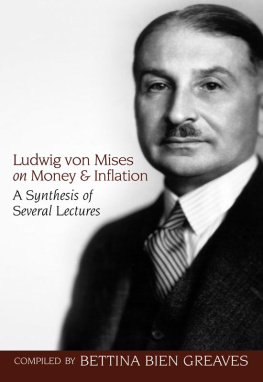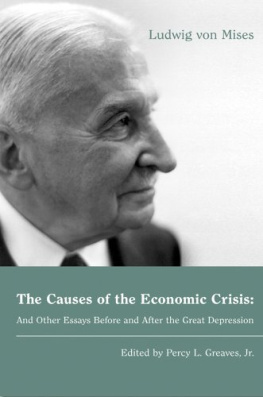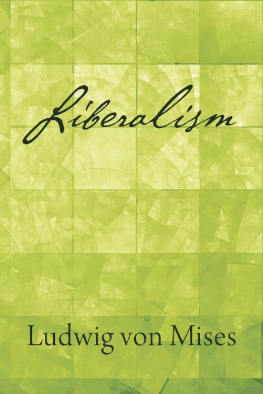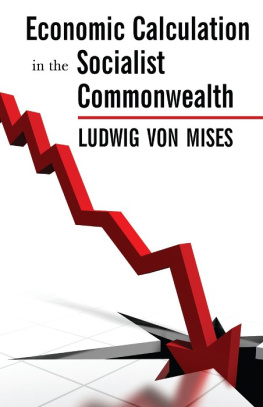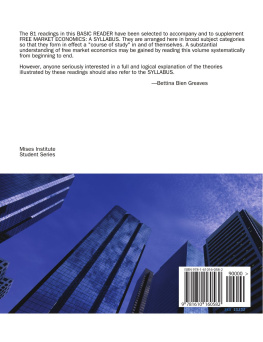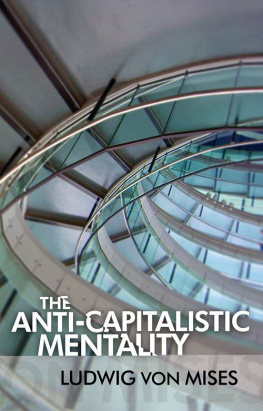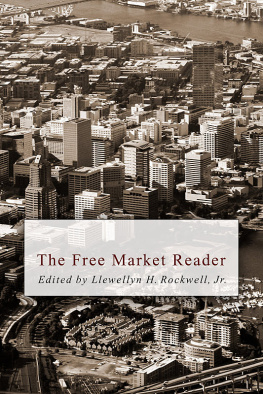LUDWIG VON MISES
ON
MONEY AND INFLATION
A Synthesis of Several Lectures
LUDWIG VON MISES
ON
MONEY AND INFLATION
A Synthesis of Several Lectures
Bettina Bien Greaves


Copyright 2010 by the Ludwig von Mises Institute
10 9 8 7 6 5 4 3 2 1
Published under the Creative Commons Attribution License 3.0.
http://creativecommons.org/licenses/by/3.0/
Ludwig von Mises Institute
518 West Magnolia Avenue
Auburn, Alabama 36832
mises.org
ISBN: 978-1-933550-75-6
CONTENTS
Introduction
Upon the establishment of the Foundation for Economic Education (FEE) in 1946, Ludwig von Mises became a part-time adviser, and he served in that capacity until his death in 1973. Whenever FEE held a seminar in Irvington, if he was in town he would drive out from New York City, where he lived with his wife, Margit, to speak to the participants. His topic was quite often inflation. I attended all those lectures, took them down in shorthand and later transcribed them. The thought occurred to me that eight to ten of his lectures on inflation, delivered in the 1960s, might be integrated, with the duplications deleted, and turned into a single piece. Hence this paper.
Mises did not like to have his oral remarks quoted or published because, obviously, they did not represent the care and precision he devoted to his writings. However, it does not seem to me that these lectures, as I have edited them, misrepresent his ideas in any way. Moreover, they reveal his unpretentious manner and the informal simple style he used when talking to students. He often rephrased an idea in several different ways, repeating it for emphasis. He was frequently accused of being simplistic, of making economic subjects appear too clear and simple, but it was this very approach that made it possible for persons, even those without any background in economics, to understand and appreciate what he was saying.
Bettina Bien Greaves
CHAPTER
ONE
Human Cooperation
Human cooperation is different from the activities that took place under prehuman conditions in the animal kingdom and among isolated persons or groups during the primitive ages. The specific human faculty that distinguishes man from animal is cooperation. Men cooperate. That means that, in their activities, they anticipate that activities on the part of other people will accomplish certain things in order to bring about the results they are aiming at with their own work. The market is that state of affairs under which I am giving something to you in order to receive something from you. I dont know how many of you have some inkling, or idea, of the Latin language, but in a Latin pronouncement 2,000 years ago already, there was the best description of the marketdo ut desI give in order that you should give. I contribute something in order that you should contribute something else. Out of this there developed human society, the market, peaceful cooperation of individuals. Social cooperation means the division of labor.
The various members, the various individuals, in a society do not live their own lives without any reference or connection with other individuals. Thanks to the division of labor, we are connected with others by working for them and by receiving and consuming what others have produced for us. As a result, we have an exchange economy which consists in the cooperation of many individuals. Everybody produces, not only for himself alone, but for other people in the expectation that these other people will produce for him. This system requires acts of exchange.
The peaceful cooperation, the peaceful achievements of men are effected on the market. Cooperation necessarily means that people are exchanging services and goods, the products of services. These exchanges bring about the market. The market is precisely the freedom of people to produce, to consume, to determine what has to be produced, in whatever quantity, in whatever quality, and to whomever these products are to go. Such a free system without a market is impossible; such a free system is the market.
We have the idea that the institutions of men are either (1) the market, exchange between individuals, or (2) the government, an institution which, in the minds of the many people, is something superior to the market and could exist in the absence of the market. The truth is that the governmentthat is the recourse to violence, necessarily the recourse to violencecannot produce anything. Everything that is produced is produced by the activities of individuals and is used on the market in order to receive something in exchange for it.
It is important to remember that everything that is done, everything that man has done, everything that society does, is the result of such voluntary cooperation and agreements. Social cooperation among menand this means the marketis what brings about civilization and it is what has brought about all the improvements in human conditions we are enjoying today.
CHAPTER
TWO
The Medium of ExchangeMoney
The definition of money is very simple. Money is the general medium of exchange used on the market. Money, the medium of exchange, is something that individuals choose in order to facilitate the exchange of commodities. Money is a market phenomenon. What does that mean? It means that money developed on the market, and that its development and its functioning have nothing to do with the government, the state, or with the violence exercised by governments.
The market developed what is called indirect exchange. The man who couldnt get what he wanted on the market through direct exchange, through barter, took something else, something that was considered more easily negotiable, something which he expected to trade later for what he really wanted. The market, the people on the market, the people in organizing the division of labor and bringing about the system in which one man produces shoes and another produces coats, brought about the system in which coats can be exchanged against shoes, but only practically on account of the difference of the importance and the value, by the intermediary of money. Thus the market system made it possible for people who could not get today what they needed, what they wanted to buy on the market, to take, in return for what they brought to trade, a medium of exchangethat means something that was more easily used on the market than what they brought to the market to exchange. With a medium of exchange, the originators of the exchange can attain satisfaction finally by acquiring those things which they themselves want to consume.
Money is a medium of exchange because people use it as such. People dont eat the money; they ask for the money because they want to use it to give it away in a new contract. And this barter or trade is technically possible only if there is a medium of exchange, a money, against which he can exchange what he has for the things he wants and needs. All the mutual givings and receivings that take place on the market, all these mutual exchanges that lead to the development of money, are the voluntary achievements of individual people.
Through a long evolution, governments, or certain groups of governments, have promoted the idea that money is not simply a market phenomenon, but that it is whatever the government calls money. But money is not what the government says. The idea of money is that it is a medium of exchange; somebody who sells something and is not in a position to exchange again immediately for the thing he wants to consume gets something else which he can exchange for this at a later date. This something else is a medium of exchange, because the man who sells, let us say, chickens or eggs, does not, or cannot get directly what he wants himself to consume, but must take something else which he uses at a later date in order to get what he needs.

